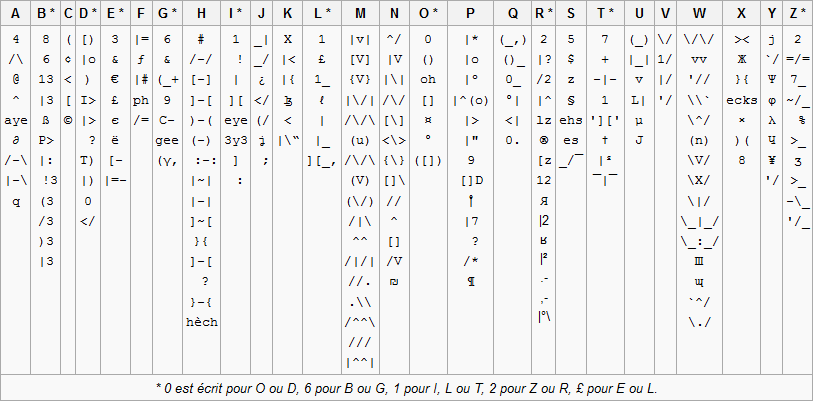

Where S is the total number of possible passwords, the sample space, C is the number of characters in the pool of characters available to us, and N is the number of characters our password has. To calculate the sample space of a password, we can use the following formula: S = C ^ N. We had ten valid characters as input for each digit, so 10 x 10 x 10 x 10 or 10^4. If you look back at our example, you'll see that we calculated the sample space by multiplying the number of allowed characters for each digit allowed.
L33t speek how to#
How to Calculate the Sample Space of Your Password? To make it as hard as possible to crack your password, you have to increase its sample space as much as possible (it's harder to guess the correct password out of a trillion possibilities than a thousand possibilities).
L33t speek cracked#
A 4-digit PIN would be cracked instantly. However, while it is pretty unlikely that the thief will have enough time to type in 10,000 combinations in an ATM, a regular computer today can make tens of billions of attempts per second. What happens, in reality, is that a subset of those 10,000 possibilities happens much more frequently in the real world - 1234 or 1111 end up appearing way more than, say, 8065. We tend to follow predictable patterns, even if it feels to us like we came up with random numbers: we tend to use sequential numbers, we are more likely to think in groups of two or four numbers because of our date system, etc. Now, this is not entirely true in practice because humans can't pull a number combination - or anything - out of their minds randomly. The chance of an attacker correctly guessing your password by pure chance would be 1 out of a sample space of 10,000 passwords.

In total, there are 10 x 10 x 10 x 10 = 10,000 possible passwords, one of which is your password. And the same thing is valid for the third and fourth digits. Since there's no restriction in place for the second digit that would limit his choices (e.g., if you couldn't create a PIN with repeated numbers), there are also ten possibilities. Well, the first digit of your PIN can be any number between 0 and 9, so there are ten possibilities in total. What are the chances that he guesses your password correctly, by pure chance? (Let's also assume the bank won't freeze your credit card after five or so failed attempts, as it's common practice today.)Īnd like most banks, let's assume your bank requires a 4-digit PIN to let you withdraw money from an ATM. Let's say an attacker stole your credit card without you noticing and wants to withdraw money from your bank account.

Users are then left with two problems: an insecure password and a false sense of security since the password looks complicated to them, but it's easy for a computer to crack.īy helping you understand how exactly passwords are cracked and the math behind it, you will be in a better position to create or instruct other people on how to create good passwords.
L33t speek Offline#
Even after many cries from the cybersecurity community, many people still believe swapping letters for a numerical equivalent ("l33t" speak) makes their password harder to crack (i.e., when the adversary has possession of a database of hashed passwords - an offline attack), when in fact it does nothing. This happens, in part, because most people don't know how their passwords are actually exploited. Evidence suggests that people are annoyed when such arbitrary measures are put in place and end up choosing weaker passwords. You've probably stumbled onto websites that have password requirements: they might require a minimum number of characters, or perhaps a number and a symbol.īut does that really make a better password?ĭespite their best intentions, policies lead people to choose horrible passwords.


 0 kommentar(er)
0 kommentar(er)
